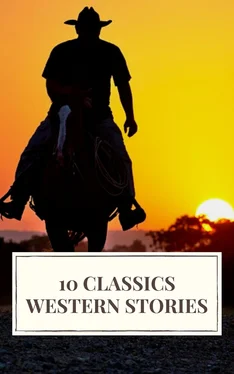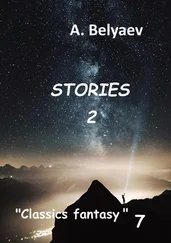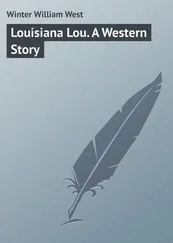"Jerusalem, Jerusalem,
Lift up your gates and sing
Hosanna in the high-est.
Hosanna to your King!"
The near cattle lifted their heads to stare stupidly a moment, then moved a few steps slowly, nosing for the sweetest grass-tufts. The horses shifted their weight, resting one leg with the hoof barely touching the earth, twitched their ears at the flies and slept again.
"And then me thought my dream was changed,
The streets no longer rang,
Hushed were the glad Hosannas
The little children sang—"
Tamale lifted his head and gazed inquiringly up the hill; but Bob was not observant of signs just then. He was Striving with his recreant memory for the words that came after:
"The sun grew dark with mystery,
The morn was cold and still,
As the shadow of a cross arose
Upon a lonely hill."
Tamale stirred restlessly with head uplifted and ears pointed straight before up the steep bluff. Old Ironsides, Thurston's mount, was not the sort to worry about anything but his feed, and paid no attention. Bob turned and glanced the way Tamale was looking; saw nothing, and settled down again on the small of his back.
"He sees a badger or something," he Said. "Go on, Bud, with the chorus."
"Jerusalem, Jerusalem,
Lift up your gates and sing."
"Lift up your hands damn quick!" mimicked a voice just behind. "If yuh ain't got anything to do but lay in the shade of a rock and yawp, we'll borrow your cayuses. You ain't needin' 'em, by the looks!"
They squirmed around until they could stare into two black gun-barrels—and then their hands went up; their faces held a particularly foolish expression that must have been amusing to the men behind the guns.
One of the gun-barrels lowered and a hand reached out and quietly took possession of Tamale's reins; the owner of the hand got calmly into Bob's saddle. Bob gritted his teeth. It was evident their movements had been planned minutely in advance, for, once settled to his liking, the fellow tested the stirrups to make sure they were the right length, and raising his gun pointed it at the two in a business-like manner that left no doubt of his meaning. Whereupon the man behind them came forward and appropriated Old Ironsides to his own use.
"Too bad we had to interrupt Sunday-school," he remarked ironically. "You can go ahead with the meetin' now—the collection has been took up." He laughed without any real mirth in his voice and gathered up the reins. "If yuh want our horses, they're up on the bench. I don't reckon they'll ever turn another cow, but such as they are you're quite welcome. Better set still, boys, till we get out uh sight; one of us'll keep an eye peeled for yuh. So long, and much obliged." They turned and rode warily down the slope.
"Now, wouldn't that jar yuh?" asked Bob in deep disgust His hands dropped to his sides; in another second he was up and shooting savagely. "Get behind the rock, Bud," he commanded.
Just then a rifle cracked, and Bob toppled drunkenly and went limply to the grass.
"My God!" cried Thurston, and didn't know that he spoke. He snatched up Bob's revolver and fired shot after shot at the galloping figures. Not one seemed to do any good; the first shot hit a two-year-old square in the ribs. After that there were no cattle within rifle range
One of the outlaws stopped, took deliberate aim with the stolen Winchester and fired, meaning to kill; but he miscalculated the range a bit and Thurston crumpled down with a bullet in his thigh. The revolver was empty now and fell smoking at his feet. So he lay and cursed impotently while he watched the marauders ride out of sight up the valley.
When the rank timber-growth hid their flying figures he crawled over to where Bob lay and tried to lift him.
"Art you hurt?" was the idiotic question he asked.
Bob opened his eyes and waited a breath, as if to steady his thought. "Did I get one, Bud?"
"I'm afraid not," Thurston confessed, and immediately after wished that he had lied and said yes. "Are you hurt?" he repeated senselessly.
"Who, me?" Bob's eyes wavered in their directness. "Don't yuh bother none about me," evasively.
"But you've got to tell me. You—they—" He choked over the words.
"Well—I guess they got me, all right. But don't let that worry yuh; it don't me." He tried to speak carelessly and convincingly, but it was a miserable failure. He did not want to die, did Bob, however much he might try to hide the fact.
Thurston was not in the least imposed upon. He turned away his head, pretending to look after the outlaws, and set his teeth together tight. He did not want to act a fool. All at once he grew dizzy and sick, and lay down heavily till the faintness passed.
Bob tried to lift himself to his elbow; failing that, he put out a hand and laid it on Thurston's shoulder. "Did they— get you- -too?" he queried anxiously.
"The damn coyotes!"
"It's nothing; just a leg put out of business," Thurston hurried to assure him. "Where are you hurt, Bob?"
"Aw, I ain't any X-ray," Bob retorted weakly but gamely. "Somewheres inside uh me. It went in my side but the Lord knows where it wound up. It hurts, like the devil." He lay quiet a minute. "I wish—do yuh feel—like finishing— that song, Bud?"
Thurston gulped down a lump that was making his throat ache. When he answered, his voice was very gentle:
"I'll try a verse, old man."
"The last one—we'd just come to the last. It's most like church. I—I never went—much on religion, Bud; but when a fellow's—going out over the Big Divide."
"You're not!" Thurston contradicted fiercely, as if that could make it different. He thought he could not bear those jerky sentences.
"All right—Bud. We won't fight over it. Go ahead. The last verse."
Thurston eased his leg to a better position, drew himself up till his shoulders rested against the rock and began, with an occasional, odd break in his voice:
"I saw the holy city
Beside the tideless Sea;
The light of God was on its street
The gates were open wide.
And all who would might enter
And no one was denied."
"Wonder if that there—applies—to bone-headed— cowpunchers," Bob muttered drowsily. "'And all—who would—" Thurston glanced quickly at his face; caught his breath sharply at what he saw there written, and dropped his head upon his arms.
And so Park and his men, hurrying to the sound of the shooting, found them in the shadow of the rock.
Chapter 7 At the Stevens Place
When the excitement of the outrage had been pushed aside by the insistent routine of everyday living, Thurston found himself thrust from the fascination of range life and into the monotony of invalidism, and he was anything but resigned. To be sure, he was well cared for at the Stevens ranch, where Park and the boys had taken him that day, and Mrs. Stevens mothered him as he could not remember being mothered before.
Hank Graves rode over nearly every day to sit beside the bed and curse the Wagner gang back to their great-great-grandfathers and down to more than the third generation yet unborn, and to tell him the news. On the second visit he started to give him the details of Bob's funeral; but Thurston would not listen, and told him so plainly.
"All right then, Bud, I won't talk about it. But we sure done the right thing by the boy; had the best preacher in Shellanne out, and flowers till further notice: a cross uh carnations, and the boys sent up to Minot and had a spur made uh—oh, well, all right; I'll shut up about it, I know how yuh feel, Bud; it broke us all up to have him go that way. He sure was a white boy, if ever there was one, and—ahem!"
"I'd give a thousand dollars, hard coin, to get my hands on them Wagners. It would uh been all off with them, sure, if the boys had run acrost 'em. I'd uh let 'em stay out and hunt a while longer, only old Lauman'll get 'em, all right, and we're late as it is with the calf roundup. Lauman'll run 'em down—and by the Lord! I'll hire Bowman myself and ship him out from Helena to help prosecute 'em. They're dead men if he takes the case against 'em, Bud, and I'll get him, sure—and to hell with the cost of it! They'll swing for what they done to you and Bob, if it takes every hoof I own."
Читать дальше












